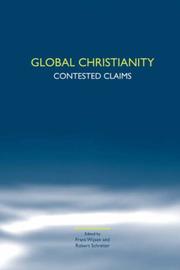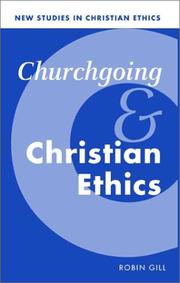| Listing 1 - 6 of 6 |
Sort by
|
Book
ISBN: 1283232340 9786613232342 0199877491 9780199877492 9780199911530 0199911533 9780199767465 0199767467 9781283232340 6613232343 Year: 2011 Publisher: Oxford ; New York : Oxford University Press,
Abstract | Keywords | Export | Availability | Bookmark
 Loading...
Loading...Choose an application
- Reference Manager
- EndNote
- RefWorks (Direct export to RefWorks)
In this new and substantially expanded Third Edition, Philip Jenkins continues to illuminate the remarkable expansion of Christianity in the global South--in Africa, Asia, and Latin America. Drawing upon the extensive new scholarship that has appeared on this topic in recent years, he asks how the new Christianity is likely to affect the poor, among whom it finds its most devoted adherents. How should we interpret the enormous success of prosperity churches across the Global South? Politically, what will be the impact of new Christian movements? Will Christianity contribute to liberating the poor, to give voices to the previously silent, or does it threaten only to bring new kinds of division and conflict? Does Christianity liberate women, or introduce new scriptural bases for subjection?
Book
ISBN: 1462780903 9781462780907 9781462780891 146278089X Year: 2018 Publisher: Nashville : B&H Publishing Group,
Abstract | Keywords | Export | Availability | Bookmark
 Loading...
Loading...Choose an application
- Reference Manager
- EndNote
- RefWorks (Direct export to RefWorks)
In language that is warm, pithy and, of course, welcoming, bestselling author Thom S. Rainer (I Am a Church Member, Autopsy of a Deceased Church) created a tool for churches to become more hospitable..
Book
ISBN: 0252053176 9780252053177 9780252044212 9780252086250 Year: 2021 Publisher: Urbana : University of Illinois Press,
Abstract | Keywords | Export | Availability | Bookmark
 Loading...
Loading...Choose an application
- Reference Manager
- EndNote
- RefWorks (Direct export to RefWorks)
Often seen as ethnically monolithic, the African Methodist Episcopal (AME) Church in fact successfully pursued evangelism among diverse communities of indigenous peoples and Black Indians. Christina Dickerson-Cousin tells the little-known story of the AME Church's work in Indian Territory, where African Methodists engaged with people from the Five Civilized Tribes (Cherokees, Creeks, Choctaws, Chickasaws, and Seminoles) and Black Indians from various ethnic backgrounds. These converts proved receptive to the historically Black church due to its traditions of self-government and resistance to white hegemony, and its strong support of their interests. The ministers, guided by the vision of a racially and ethnically inclusive Methodist institution, believed their denomination the best option for the marginalized people.
Church membership --- Indians of North America --- History. --- Religion. --- African Methodist Episcopal Church --- Missions

ISBN: 9401204322 1435612183 9781435612181 9042021926 9789042021921 9042021926 9789042021921 9789401204323 Year: 2007 Publisher: Amsterdam ; New York, NY : Rodopi,
Abstract | Keywords | Export | Availability | Bookmark
 Loading...
Loading...Choose an application
- Reference Manager
- EndNote
- RefWorks (Direct export to RefWorks)
In 2002 Philip Jenkins wrote The Next Christendom . Over the past half century the centre of gravity of the Christian world has moved decisively to the global South, says Jenkins. Within a few decades European and Euro-American Christians will have become a small fragment of world Christianity. By that time Christianity in Europe and North America will to a large extent consist of Southern-derived immigrant communities. Southern churches will fulfil neither the Liberation Dream nor the Conservative Dream of the North, but will seek their own solutions to their particular problems. Jenkins’ book evoked strong reactions, a bit to his own surprise, as the book contained little new. In the United States of America, the prospect of a more biblical Christianity caused reactions of alarm in liberal circles. In contrast, conservatives were delighted by the same prospect. In Europe the book landed in the middle of the debate on Europe as an exceptional case. It was detested by those who stick to the theory of ongoing and irreversible secularisation and welcomed by those who see a resurgence of religion, also in Europe. In the present volume, scholars of religion and theologians assess the global trends in World Christianity as described in Philip Jenkins’ book. It is the outcome of an international conference on Southern Christianity and its relation to Christianity in the North, held in the Conference Centre of Radboud University Nijmegen, the Netherlands.
Christianity --- Religions --- Church history --- Forecasting --- Jenkins, Philip, --- Criticism, Textual --- Church membership --- Membership, Church --- Church polity --- Confirmation --- Membership
Book
ISBN: 0231551800 Year: 2022 Publisher: New York : Columbia University Press,
Abstract | Keywords | Export | Availability | Bookmark
 Loading...
Loading...Choose an application
- Reference Manager
- EndNote
- RefWorks (Direct export to RefWorks)
The Struggle to Stay is an intimate and insightful portrait of single women's experiences in evangelical churches. Drawing on unprecedented access to churches in the United States and the United Kingdom, Katie Gaddini relates the struggles of four women, interwoven with her own story of leaving behind a devout faith.
Single women --- Church membership. --- Church attendance. --- Religious life. --- #MeToo. --- Christian women's issues. --- evangelical Christianity. --- evangelical churches. --- leaving the church. --- religious right.

ISBN: 0521578280 9780521570589 0521570581 9780521578288 1107113377 0511007744 0511171889 0511309651 0511149425 0511605633 1280429151 0511053622 9780511007743 0511038380 9780511038389 9780511605635 9780511149429 9781280429156 9780511171888 9780511309656 9780511053627 9781107113374 Year: 1999 Volume: 15 Publisher: Cambridge: Cambridge University Press,
Abstract | Keywords | Export | Availability | Bookmark
 Loading...
Loading...Choose an application
- Reference Manager
- EndNote
- RefWorks (Direct export to RefWorks)
Robin Gill argues that once moral communities (such as churchgoers) take centre stage in ethics - as they do in virtue ethics - then there should be a greater interest in sociological evidence about these communities. This book, first published in 1999, examines evidence gathered from social attitude surveys about church communities, in particular their views on faith, moral order and love. It shows that churchgoers are distinctive in their attitudes and behaviour. Some of their attitudes change over time, and there are a number of obvious moral disagreements between different groups of churchgoers. Nonetheless, there are broad patterns of Christian beliefs, teleology and altruism which distinguish churchgoers as a whole from non-churchgoers. However, the values, virtues, moral attitudes and behaviour of churchgoers are shared by many other people as well. The distinctiveness of church communities in the modern world is thus real but relative, and is crucial for the task of Christian ethics.Examines recent social attitude surveys to compare the views of churchgoing and non-churchgoing communities, focusing on faith, moral order and loveConcludes that whether or not someone goes to church regularly is a good indicator of a whole range of beliefs, moral attitudes and behaviourConsiders the implications of churchgoing for ethics in a postmodern age
316:2 --- 316:2 Godsdienstsociologie --- Godsdienstsociologie --- Christian ethics --- Christians --- Church attendance --- Public opinion --- Attendance, Church --- Church-going --- Church membership --- Public worship --- Religious adherents --- Ethical theology --- Moral theology --- Theology, Ethical --- Theology, Moral --- Christian life --- Christian philosophy --- Religious ethics --- Attitudes --- Great Britain --- Morale chrétienne --- Théologie morale --- Opinion publique --- Pratique religieuse --- Arts and Humanities --- Religion --- Public opinion. --- Attitudes.
| Listing 1 - 6 of 6 |
Sort by
|

 Search
Search Feedback
Feedback About UniCat
About UniCat  Help
Help News
News